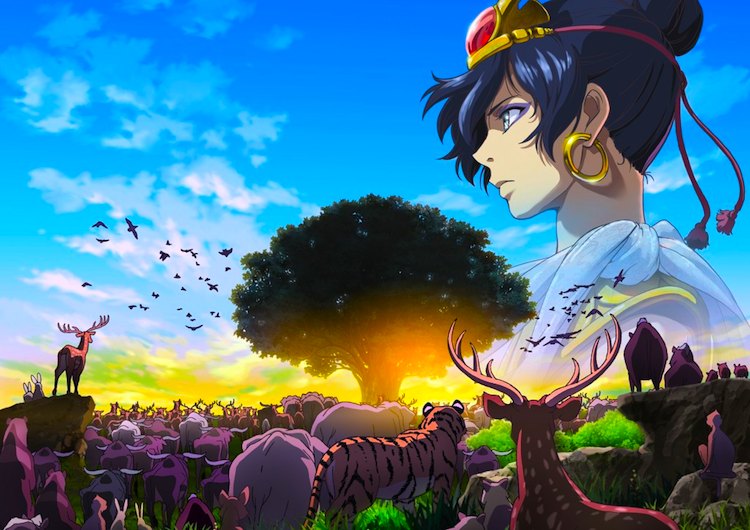By Joe Bendel. People think religion is all about sermonizing and casting judgment, but not Osamu Tezuka. His Eisner Award winning manga serialization of Gautama Buddha’s life emphasizes all the good parts, particularly the violence and passion of India circa 500-600 BC. Check your peaceful coexistence t-shirts and bumper stickers at the door when Kozo Morishita’s anime adaptation, Osamu Tezuka’s Buddha: The Great Departure, the first installment of projected feature trilogy, screens as a joint presentation of the 2011 New York Asian Film Festival and the 2011 Japan Cuts Festival of Contemporary Japanese Cinema.
Of course, Buddha was born Siddhartha Gautama, the privileged son of the king of the Shakya Kingdom. Shakya’s bounteous natural resources are coveted by the more Spartan Kosala kingdom, but providence has protected somewhat more peaceful Shakya, so far. As the Kosalan Army masses for an invasion, providence gets a bit of help from Tatta, an untouchable Oliver Twist with a supernatural power to possess nature’s creatures. Much to Tatta’s surprise, his new running mate Chapra takes advantage of the fog of war to save the Kosalan general, earning his protection and patronage as a supposed warrior class orphan.
None of this really has anything to do with Siddhartha. His path will only tangentially cross that of Tatta and his compatriots, at least in this film. However, as untouchables, they act as an effective counterpoint to the insular upper-class life Siddhartha will eventually reject. Indeed, Departure is a pointed critique of the caste system, largely driven by the story of Chapra’s forbidden attempt at social mobility. Naturally, combat will play a significant role in his efforts.
In terms of tone and plot developments, Departure is more closely akin to Braveheart than Little Buddha. Still, the anime Siddhartha is far more expressive and multi-dimensional than Keanu Reeves. Naturally, Buddhist themes and motifs abound, but the narrative is really driven by hack-and-slash warfighting. One can only guess what His Holiness would think of such an approach (which is never disrespectful to the Buddha in his earthly incarnation), but it should go down real smooth with NYAFF regulars.
Tezuka (1928-1989) was an anime legend for crossover hits like Astro Boy and Kimba the White Lion, which genre fanboys consider the unacknowledged source material for The Lion King, to put it diplomatically. While Departure’s animation is a cut above Astro Boy or run-of-the-mill anime, it never creates the sense of wonder present in the work of either Miyazaki. Still, Morishita’s team delineates the battle scenes with guts and clarity, while also sensitively rendering the archetypal images of Tezuka’s story.
Departure definitely falls well towards the high end of the anime spectrum, especially in terms of its ambition. Even if not as lushly crafted as the senior Miyazaki’s masterworks, its considerable scope is still better served by the big screen. Recommended for anime enthusiasts and student-admirers of Buddhism (who do not get hung up on historical details), Departure screens Thursday (7/7) and the following Sunday (7/10) at the Japan Society as part of both the 2011 NYAFF and Japan Cuts festivals.
Posted on July 1st, 2011 at 10:14am.
